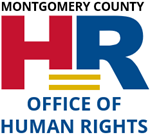Compliance & Complaints
Compliance Enforcement
The Compliance Section is the civil rights enforcement operation of the Office of Human Rights. It has jurisdiction over private employers in Montgomery County (including the Montgomery County Government), real estate transactions (both housing and commercial real estate), and places of public accommodation. The Compliance Section receives, investigates and resolves formal complaints of discrimination. The Compliance Section specifically enforces the following County laws:
- Montgomery County Code, Chapter 27, Article I
- Article X. Displaced Service Workers Protection Act, Section 27-66A
- Article XI. County Minimum Wage, Section 27-70
- Article XII. Fair Criminal Record Screening Standards, Section 27-72
- Article XIII. Earned Sick and Safe Leave, Section 27-77
- Article XV. Minimum Work Week for Building Maintenance Workers, Section 27-85

Gender Inclusive Public Restrooms
Environmental Health
In an effort to make Montgomery County more inclusive to all residents, regardless of gender or gender identity, the County Council unanimously passed Bill 4-22, Human Rights and Civil Liberties – Public Accommodations – Gender Inclusive (PDF). The bill requires that all single occupancy public bathrooms in the Montgomery County are identified with gender inclusive signage. The legislation became effective on Nov. 7, 2022.
This bill applies to all County government buildings and any building with an existing publicly accessible single occupancy toilet with an entry door that can be locked inside by an occupant. The bill does not apply to private restrooms in a residence, a hotel or motel, or restrooms that are only accessible from a private room or office.
Any business can comply with this law by having a sign that
- does not indicate a specific gender, and
- contains descriptive language (such as ‘restroom,’ ‘bathroom,’ or ‘toilet’) or a picture that indicates the restroom’s availability for use regardless of gender or gender identity.
The Department of Health and Human Services (DHHS) will enforce existing restrooms and the Department of Permitting Services (DPS) will enforce new and renovated construction. If you see a building or restaurant with a single occupancy public bathroom not in compliance, please call 311, visit 311
online or email
[email protected].
Read
Gender Inclusive Restrooms - Bill-22 (PDF)
Types of Complaints:
- Employment Complaints are accepted based on race, color, religious creed, ancestry, national origin, marital status, age, sex, sexual orientation, disability, genetic status, family responsibilities, and gender identity.
- Real Estate Complaints are accepted on the bases of race, color, age, religious creed, sex, sexual orientation, national origin, ancestry, disability, marital status, source of income, presence of children, family responsibilities, and gender identity.
- Public Accommodation Complaints are accepted on the bases of race, color, national origin, ancestry, sex, sexual orientation, disability, marital status, religious creed, and gender identity.
Penalties and Relief
Damages not exceeding $5,000 for humiliation and embarrassment, based on the nature of the humiliation and embarrassment, including its severity, duration, frequency, and breadth of observation by others.
Important Note
Subparagraph (E) of Sec. 27-8(a)(1) was amended by 2005 L.M.C., ch. 29, § 2 (Bill 36- 04). However, in American Financial Services, et. al. v. Montgomery County, (Civil Action No. 269105), the Court declared Bill 36-04 “null and void” by order dated 11/30/06. Prior to 2005 L.M.C., ch 29, subparagraph (E) read as follows: (E) up to $5,000 for humiliation and embarrassment, based on the nature of the humiliation and embarrassment, including its severity, duration, frequency, and breadth of observation by others
Submit an Inquiry
Please use the Intake Inquiry Form to submit information about your experience. The form is designed for intake use only and is not considered a formal complaint. A formal complaint must be approved at the intake stage, then signed and notarized. Inquiries and/or questions concerning possible violations can also be made by calling 311.
A structured intake process is used to evaluate and validate intake inquiries. Once a complaint inquiry is accepted, both parties are offered mediation. If either or both parties decline mediation, or if mediation fails, cases are investigated and resolved or settled with the findings on the merits of the complaint. The Commission has the authority to order relief and penalties. A de novo public hearing (administrative trial) is mandatory for those discrimination cases that cannot be voluntarily settled after a finding of discrimination.
It is recommended that you make an appointment in advance to ensure your claim/inquiry is managed sufficiently.
Information regarding the mediation process is provided in English and Spanish using the links below.
Make an Appointment to File an Inquiry
Inquiries are handled in-person,
at the Office of Human Rights, or virtually Monday through Friday from
9 AM - 4 PM.
- Book/Schedule an In-Person or Virtual Appointment
- Email us @ [email protected] requesting a date/time to discuss your complaint/inquiry
- Call our office at 240-777-8450 to book/schedule an appointment
